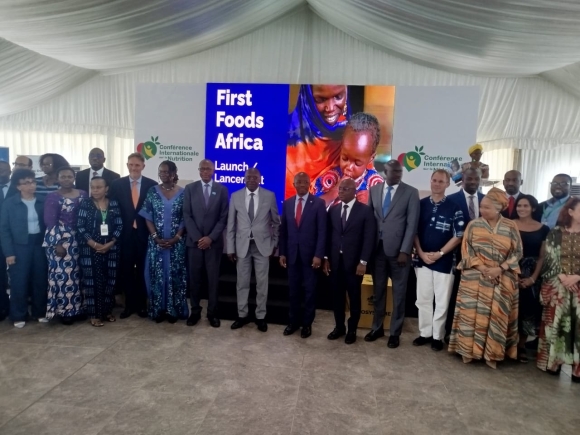UNICEF has launched a continental initiative that seeks to address child food poverty and malnutrition through nutrition-sensitive food systems.
Dubbed “First Foods Africa Initiative”, it is anchored on UNICEF’s Nutrition Strategy 2020–2030 and UNICEF’s Vision on Food Systems for Children, as well as serving as a cornerstone of the UNICEF Africa Strategy, aligned with the Agenda 2063 of the African Union (AU).
The initiative intends to dramatically reduce the prevalence of child food poverty and undernutrition across the continent.
In its first phase, millions of children under five in the targeted countries are expected to gain improved access to nutritious foods, better policy protection, and healthier eating practices.
UNICEF said the programme would begin in 14 priority countries across the continent, spanning West, Central, East, and Southern Africa, and implementation would rely on strong partnerships with governments, African food companies, and global institutions, including the Food and Agriculture Organisation, the World Bank, the World Food Programme and the World Health Organisation.
Decisive step
A partnership between UNICEF, the AU Commission (AUC) and the government of Benin, the initiative is built on three strategic pillars namely to incentivise local production of nutritious, safe, affordable, and sustainable first foods in Africa, by Africa for children under five; strengthen policy environments to protect, promote, and support access to those foods for all children, and stimulate consumption through large-scale social marketing, behaviour change programmes, and community engagement.
Speaking at the launch of the initiative in Benin on September 29, the Director of Health and Humanitarian Affairs at the AUC, Professor Julio Rakotonirina, described the initiative as “a decisive step towards eradicating child malnutrition and building resilient food systems across the continent”.
He asserted that “nutrition is a right for every child, regardless of their geographic or economic background.”
“With the launch of First Foods Africa, we affirm that good nutrition is a right. Hunger is preventable.
The African Union Commission is working hand in hand with UNICEF, member states, regional bodies, and the private sector to amplify this initiative.
“It is our continental call because investing in children’s first foods means we are investing in Africa’s first and greatest wealth and its people,” he stated.
Data
Data from UNICEF showed that globally, one in four children under age five, roughly 181 million, live in severe child food poverty.
About one-third (some 57 million) of these children are in sub-Saharan Africa, where diets are severely limited and children miss essential nutrients required for healthy development.
Severe child food poverty is a major driver of persistent undernutrition, including both stunting and wasting.
While many African countries have reduced stunting rates from 41.5 per cent in 2000 to about 32.3 per cent, population growth means that the total number of stunted children increased from 55.1 million to 62.3 million.
Some 11.4 million African children suffer from wasting. Most sub-Saharan nations are not on track to meet the 2030 SDG nutrition targets.
UNICEF defines child food poverty as the inability of children in early life to access and consume a sufficiently diverse, nutritious diet.
To meet minimal dietary diversity for healthy growth, a child must eat from at least five out of eight food groups.
Children receiving only three or four groups are in food poverty; those with two or fewer are in severe food poverty.
Transformative
UNICEF’s Deputy Executive Director, Omar Abdi, speaking at the launch, described the initiative as “a transformative moment for Africa’s children.”
The Minister of State in charge of Government Action Coordination, Abdoulaye Bio Tchane, reaffirmed the commitment of the government of Benin to champion child nutrition, pointing out that child nutrition was essential to building a resilient continent.
Other participants, including regional leaders, civil society actors, and private sector representatives, echoed support for reshaping food systems to meet children’s needs.


